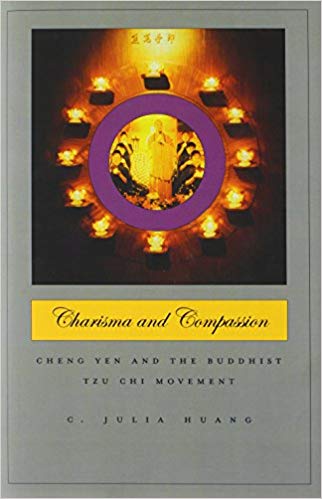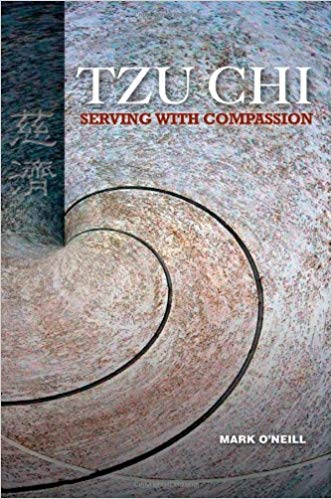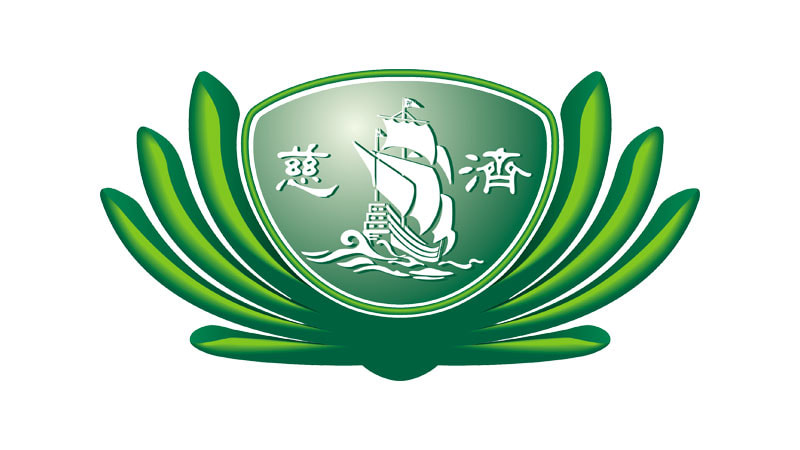Introductory Video |
Love-in-Action |
To Love Everybody
with a Sincere Heart
Introducing the Tzu Chi Foundation
The foundation is the world's largest Buddhist charity, based in Taiwan,
begun by a humble Buddhist nun, Cheng Yen, in 1996.
With origins as a Buddhist humanitarian organization,
it now has 10 million volunteers in 52 countries.
Tzu Chi in Chinese means "compassion action." Its philosophy
is that we love everybody with a sincere heart.
Its areas of focus are medicine, education, humanistic culture,
disaster relief and environmental protection.
The foundation is apolitical and non-proselytizing. It does not seek
to convert people to Buddhism and its volunteers accept all religions.
Over the years its volunteers have helped people build churches and mosques,
community centers and health clinics. Their hearts are wide.
|
Beyond Mindfulness and Personal Growth
Jay McDaniel Many westerners turn to Buddhism for its relevance to finding peace in the heart. Especially attractive is its idea that we can live mindfully in each present moment, focused on the here-and-now, not the anticipated future. This emphasis on mindfulness and its relevance to daily life is understandable. So many of us in the West are stressed, anxious, and lacking in any sense of having a quiet, inner center. We suffer from tension in our interpersonal relations, a blockage of our creative capacities, and a sense of quiet suffering, We have grown weary of the hurried, greed-based lifestyle and we turn to Buddhist practices for solace, We identify Buddhism with meditation, neglecting the fact that, more many and perhaps most Buddhists in the world, the primary practice is chanting and praying, not meditation. We may also be relatively unfamiliar with a more action-oriented Buddhism that includes and emphasizes active service to others. We forget that so many in the world -- the poor, the hungry, the forsaken, the forgotten, the incarcerated, the lonely -- can live only from hope: from "anywhere but here." We forget that dukkha includes other people's dukkha and not simply our own. In Taiwan the roots of socially-engaged Buddhism lie in a movement called humanistic Buddhism. It started with Yin Shun, who, according to Wikipedia, was a “key figure in the doctrinal exposition of Buddhism, and thus Humanistic Buddhism, in Taiwan.” His focus on humanitarianism was “carried out by a younger generation: Hsing Yun, Sheng-yen, Wei Chueh and Cheng Yen. These four figures, collectively known as the "Four Heavenly Kings of Taiwanese Buddhism", head the "Four Great Mountains", or monasteries, of Taiwanese Buddhism and Buddhist new religious movements: Fo Guang Shan, Dharma Drum Mountain, Chung Tai Shan, and Tzu Chi.” In this page, then, I share what I now know about Tzu Chi, wanting to learn still more. I am active in the “constructive postmodern” or “process” movement in mainland China, and it is interesting to me that Tzu Chi is the only faith-based charitable organization accepted by the Chinese government. It provides an excellent example what a “constructive postmodern” Buddhism might look like in China and, perhaps, in the rest of the world, the United States much included. It moves “beyond mindfulness to love-in-action.” |
Pronouncing Tzu Chi
|
|
Books on Tzu Chi
|
Charisma and Compassion
by C. Julia Huang Harvard University Press "The Venerable Cheng-yen is an unassuming Taiwanese Buddhist nun who leads a worldwide social welfare movement with five million devotees in over thirty countries--with its largest branch in the United States. Tzu-Chi (Compassion Relief) began as a tiny, grassroots women's charitable group; today in Taiwan it runs three state-of-the-art hospitals, a television channel, and a university. Cheng-yen, who has been nominated for the Nobel Peace Prize, is a leader in Buddhist peace activism and has garnered recognition by Business Week as an entrepreneurial star. Based on extensive fieldwork in Taiwan, Malaysia, Japan, and the United States, this book explores the transformation of Tzu-Chi. C. Julia Huang offers a vivid ethnography that examines the movement's organization, its relationship with NGOs and humanitarian organizations, and the nature of its Buddhist transnationalism, which is global in scope and local in practice. Tzu-Chi's identity is intimately tied to its leader, and Huang illuminates Cheng-yen's successful blending of charisma and compassion and the personal relationship between leader and devotee that defines the movement. This important book sheds new light on religion and cultural identity and contributes to our understanding of the nature of charisma and the role of faith-based organizations." Tzu Chi: Servinig with Compassion
by Mark O-Neill John Wiley and Sons Press, Syngapore "Mark O'Neill has produced a most impressive and timely book to enlighten the many people who are not yet familiar with Tzu Chi, a remarkable organization of universal compassion. While many Buddhist societies focus on meditation and personal enlightenment, Tzu Chi concentrates on community services and global outreach with the scale, vision and management skills of a large business corporation. In a world full of injustice, poverty and disasters, Tzu Chi has been a guiding light toward peace, harmony and happiness. O'Neill's book eloquently describes the story of the many individuals behind this remarkable movement." -- Professor Dominic Man-Kit Lam, Chairman, Word Eye Organization "This story of the largest worldwide organization you've never heard of will knock your socks off. First with aid to Katrina victims, first outside organization to aid the tsunami-devastated people of Indonesia, first NGO with aid after the Sichuan earthquakes in China, it's called Tzu Chi. This organization was founded by a penniless nun in an obscure town in Taiwan. Mark O'Neill has given us a page-turner in his account of how she transformed pennies in a bamboo tube into three hospitals, an international bone marrow bank, and a quick-response global rescue organization that moves faster than you can imagine. If you are overdosing on bad news, this book is a must-read. -- Don Gibbs, Founding Chair, University of California–Davis, Department of Asian Languages |
Links and Logo
The Meaning of the Logo
Lotus Flower
The lotus flower in full bloom represents enlightenment, and shows us that although we are rooted in the mud of life’s suffering, we can develop beautiful good qualities and perfect ourselves.
Eight Petals
The eight petals of the flower represent the Noble Eight-Fold Path in Buddhism, which guides our members. The path is based on: Right View, Right Thought, Right Speech, Right Behavior, Right Livelihood, Right Effort, Right Mindfulness, and Right Concentration.
The Fruit
The fruit within the flower reminds us that flowers bloom from seeds, so to create a better world, we need to plant good seeds of love and kindness, with pure thoughts and virtuous actions.
The Ship
The ship at the heart of the fruit illustrates that Tzu Chi steers a ship of compassion, offering a vessel of refuge to save all beings from suffering.
The lotus flower in full bloom represents enlightenment, and shows us that although we are rooted in the mud of life’s suffering, we can develop beautiful good qualities and perfect ourselves.
Eight Petals
The eight petals of the flower represent the Noble Eight-Fold Path in Buddhism, which guides our members. The path is based on: Right View, Right Thought, Right Speech, Right Behavior, Right Livelihood, Right Effort, Right Mindfulness, and Right Concentration.
The Fruit
The fruit within the flower reminds us that flowers bloom from seeds, so to create a better world, we need to plant good seeds of love and kindness, with pure thoughts and virtuous actions.
The Ship
The ship at the heart of the fruit illustrates that Tzu Chi steers a ship of compassion, offering a vessel of refuge to save all beings from suffering.
Videos from Tzu Chi |
The Mission of Tzu Chi
From their Website Charity Charity is at the forefront of our mission. Tzu Chi provides food, clothing, shelter, direct financial assistance, and more. We improve lives in tangible ways, and rejoice in how charity brings inner benefits too. Transforming feelings of helplessness and despair into hope and empowerment, and bringing out the good in people through the happiness they discover when helping others is also our goal. Medicine Illness is one of life’s most painful challenges. Providing medical care to those who lack the means to pay was Tzu Chi’s priority from the start. Today, we have a comprehensive network of hospitals, mobile units, doctors, medical professionals and volunteers offering free healthcare. Ours is a human and holistic approach that values the wellbeing of patient, family, and medical team equally. Education Teaching the next generation matters when you have the future in mind. Tzu Chi has schools, colleges, and universities worldwide. Their shared objective is to deliver superior education, and nurture virtue, kindness, compassion, and joy in selfless giving. With deep faith in human nature, we advance universal respect towards all people, regardless of race, culture, language or religion. Humanistic Culture Tzu Chi is dedicated to fostering humanistic culture through civil responsibility and personal character. Founded on Buddhist philosophy, we advocate the view that as individuals, we should aspire to be moral, self-aware, and willing to act for the benefit of others. We offer support and spiritual guidance for pacifying negative emotions, developing love and compassion, and attaining wisdom. A Path of Diligent PracticeThe Jing Si Dharma Lineage is a path of diligent practice.
We carry on the Dharma’s essence and make great vows. The Tzu Chi School of Buddhism is a path through the world. With compassion and wisdom, we exercise the Four Infinite Minds. With sincerity, we vow to deliver all sentient beings. With integrity, we vow to eliminate all afflictions. With faith, we vow to learn all teachings. With steadfastness, we vow to attain Buddhahood. Great loving-kindness without regrets brings infinite love. Great compassion without resentment brings infinite vows. Great joy without worries brings infinite happiness. Great equanimity without expectations brings infinite grace. We work together while remaining clear and pure like a crystal sphere. This forest of Bodhi trees flourishes from the same root. We are all united in cultivating fields of blessings. We deeply plant the roots of wisdom on the Bodhisattva-path |
The Samoan Way: A Case Study
of Tzu Chi in a Non-Buddhist Culture
|
|
|
|
|
|
|
|










